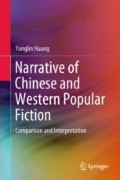Abstract
Literature used to be classified into “refined literature” and “popular literature.” Today this earlier classification of literature has evolved into that of “elite literature”, “popular literature” and “folk literature.” The prosperity of popular literature is one of the important cultural phenomena during China’s social transformation in the 20th century. Following the laws of cultural market and adapting to the mechanism of market operation, popular literature in China has now seized a large share of cultural market and has attracted a great number of readers, thus forming one of the most influential and dynamic cultural phenomena. In this chapter, we will make a discussion about the differences, connections and interactions between popular fiction, elite fiction and folktales.
Access this chapter
Tax calculation will be finalised at checkout
Purchases are for personal use only
Notes
- 1.
Qiong Yao is a popular contemporary Chinese woman writer of romantic love stories.—Translator’s note.
- 2.
Ci: a type of classical Chinese poetry, originating in the Tang Dynasty (618–907 AD) and fully developed in the Song Dynasty (960–1279 AD).—Translator’s note.
- 3.
Qu: a type of verse popular in the Yuan Dynasty (1271–1368).—Translator’s note.
- 4.
Bianwen: a popular form of narrative literature flourishing in the Tang Dynasty (618–907 AD), with alternate prose and rhymed parts for recitation and singing (often on Buddhistic themes).—Translator’s note.
References
Berlo, D.K. 1960. The Process of Communication. New York: Holt, Rinehart & Winston.
Cassirer, Ernst. 1986. An Essay on Man, trans. Gan Yang. Shanghai: Shanghai Translation Publishing House.
Chen, Dakang. 1993. The History of Popular Fiction. Changsha: Hunan Publishing House.
Hauser, Arnold. 1987. The Sociology of Art, trans. Ju Yan’an. Shanghai: Xuelin Press.
Huang, Yonglin. 1991. On Narrative Activities of Folktales from the Perspective of Information Theory. In Chinese Folk Culture, vol. 4. Shanghai: Xuelin Press.
Jiang, Yun, and Han Zhizhong. 1987. Anecdotes of the Three Kingdoms. Shanghai: Shanghai Art and Literature Publishing House.
Kagan, M. 1986. Morphology of the Arts, trans. Ling Jiyao et al. Beijing: SDX Joint Publishing Company.
Lafargue, P. 1979. On Folk Songs and Customs about Marriage. In Collected Essays of Lafargue, trans. Luo Dagang. Beijing: People’s Literature Publishing House.
Liang, Qichao. 1960. On the Relationship between Fiction and the Government of the People. In An Anthology of Literature in the Late Qing Dynasty, ed. A’Ying, vol. of Novel/Drama Studies. Beijing: Zhonghua Book Company.
Liu, Shouhua. 1987. Preface to Cao Cao Calls on Zhuge Liang Three Times. In Cao Cao Calls on Zhuge Liang Three Times, ed. Zheng Bocheng and Han Jinlin. Wuhan: Central China Normal University Press.
Lu, Xun. 1981. Complete Works of Lu Xun, vol. 9. Beijing: People’s Literature Publishing House.
Luan, Meijian. 1990. Opposition and Communication between Refined and Popular Literature. Contemporary Writers Review 3.
Malinowski, Bronislaw. 1987. A Scientific Theory of Culture, trans. Fei Xiaotong et al. Beijing: China Folk Art Publishing House.
Marquez, Garcia, and P.A. Mendoza. 1987. The Fragrance of Guava, trans. Lin Yian. Beijing: SDX Joint Publishing Company.
Marx, Karl. 1960. Morgen: Abstract of Ancient Society. In Marx and Engels on Art and Literature, vol. 2 trans. Beijing: People’s Literature Publishing House.
Marx, Karl. 1972. Introduction to Critique of Political Economy. In Selected Works of Marx and Engels, vol. 2 trans. Beijing: People’s Publishing House.
McLuhan, Marshall. 1978. Understanding Media: The Extensions of Man, trans. Ye Mingde. Taipei: Taipei Chuliu Publishing Cooperation.
Wang, Fenling. 1985. Pu Songling and Folk Literature. Shanghai: Shanghai Art and Literature Publishing House.
Zheng, Bocheng, and Han Jinlin (eds.). 1987. Cao Cao Calls on Zhuge Liang Three Times. Wuhan: Central China Normal University Press.
Zhu, Di. 1982. The Origin of Art. Beijing: China Social Sciences Press.
Zhu, Ziqing. 1966. On Seriousness. In Complete Works of Zhu Ziqing, vol. 3. Nanjing: Jiangsu Education Publishing House.
Author information
Authors and Affiliations
Corresponding author
Rights and permissions
Copyright information
© 2018 Springer-Verlag GmbH Germany, part of Springer Nature
About this chapter
Cite this chapter
Huang, Y. (2018). Popular Literature, Elite Literature and Folk Literature. In: Narrative of Chinese and Western Popular Fiction. Springer, Berlin, Heidelberg. https://doi.org/10.1007/978-3-662-57575-8_2
Download citation
DOI: https://doi.org/10.1007/978-3-662-57575-8_2
Published:
Publisher Name: Springer, Berlin, Heidelberg
Print ISBN: 978-3-662-57573-4
Online ISBN: 978-3-662-57575-8
eBook Packages: Literature, Cultural and Media StudiesLiterature, Cultural and Media Studies (R0)

